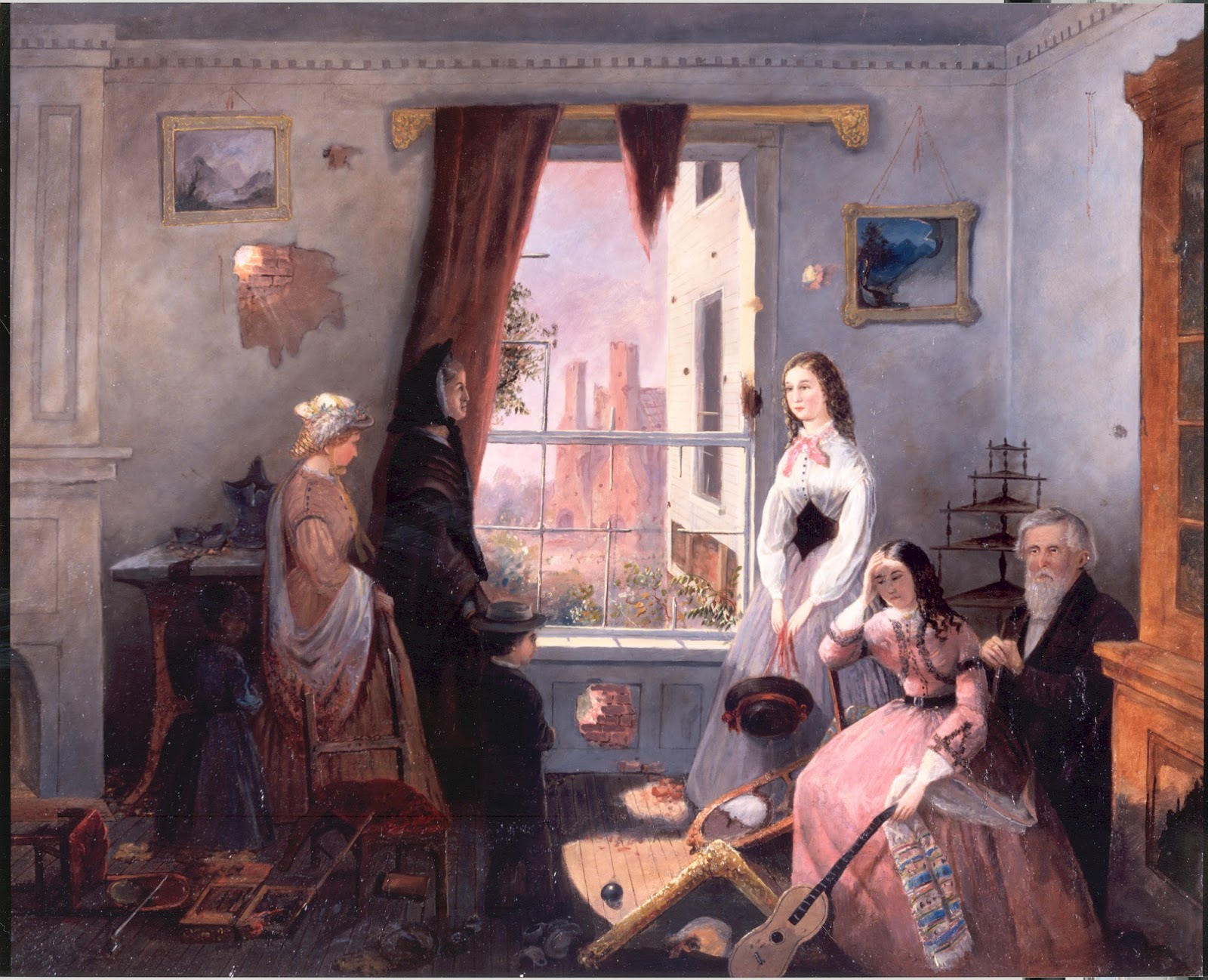Haunted by ghosts?
A few months ago, I was working my shift as a Latter-day Saint temple ordinance worker. My shift was about to end when I spotted a former friend of mine. (I’ll call her Amy.) She and I had been close friends many years previously. Our friendship had ended painfully for both of us, and we hadn’t communicated for years. Recently (and I suspect purposely), she had made her presence known to me on social media. Now, in the temple, she stood a few feet away from me. Surprisingly, I could feel the old resentful cinders spark within me.
Although Amy and I hadn’t made direct eye contact, I could tell she recognized me—whispering to her friend while pointing her finger at me. Feeling awkward, I quietly exited the room. The sparks of resentment fanned into a flame while I drove home. I asked God to help me stamp out the flame before it burst into an angry fire. Thankfully, God quickly turned my attention to the music flowing from my iPod. I listened as the Spirit sang to me through an old Carly Simon song:
“I haven’t got time for the pain. I haven’t the room for the pain. I haven’t the need for the pain.”
I calmed down; I understood. And in my understanding, the passage from Ecclesiastes, Chapter 3 came to my remembrance effectively quenching the flame:
To every thing there is a season. A time to kill, and a time to heal; a time to break down, and a time to build up; A time to weep, and a time to laugh; a time to mourn, and a time to dance; A time to embrace, and a time to refrain from embracing; A time to get, and a time to cast away; A time to keep silent, and a time to speak; A time to love, and a time to hate; a time of war, and a time of peace.
Yes, sometimes we have to fight. Sometimes, we have to confront. Sometimes, we have to defend. And in those moments, we need our pain and anger to give us the impetus, conviction, courage, and fortitude to fight for or defend our personal liberties. But when the battle is over—whether we’ve won or lost—we suffer the inevitable collateral damage. It comes in many forms: residual anger, resentment, pride, guilt, arrogance, victimhood, delusion, denial, self-loathing, hatred, depression, anxiety . . . it can be a long list of emotional pain.

Sometimes, our emotional wounds heal quickly. Sometimes, we’re scarred for life. Sometimes, our scars open and seep (as mine did when encountering my former friend). For these reasons, we will want to utilize the Spirit and our Savior’s atonement to see us through. Thus, I needed the following reminders as I drove home from the temple that day:
- I had already worked through my pain regarding this friend many years ago.
- I had already done the work of forgiving her.
- I had already found a permanent peace.
- There was no need for me to ruminate about Amy and expend negative energy in feeding my renewed pain.
- So, why walk again this path of pain if I don’t have to?
Here’s the good news: In the aftermath of battle, we alone are accountable and responsible for the depth and breadth of our own suffering. Here’s the bad news: In the aftermath of battle, we alone are accountable and responsible for the depth and breadth of our own suffering. Most of us know this already. The power to move forward and to forgive is within us. It is a process. And we need the Savior’s help to get there. But, too often, we don’t know how to proceed and end up meandering about in a fog of pain.

To find some answers, let’s explore the basic framework of interpersonal and intrapersonal (self-talk) communication in the aftermath of conflict. This communication includes the process of cleaning and repairing our battle fields. This work involves tasks such as negotiating peace with our enemies, offering apologies, praying for divine help, engaging in positive self-talk and self-analysis while we bind our wounds. Natural law demands that physical and emotional wounds take time to heal and will often scar. In the process, we can learn wisdom for the pain.
If we’re not careful, however, the aftermath of our conflicts can twist and spiral us into darkness. If we’re stuck in darkness consider this: We might think we’ve done the work in cleaning and repairing our battle fields, but why do the ghosts of battle still haunt us? For example, our battle wounds may look healed, but if we’re still nursing our wounds of resentment and anger, something’s wrong. Harder still, when no apologies or peace offerings are proffered or exchanged after battle, the clean-up, repair, and healing can be exponentially grueling and protracted. Dr. Beverly Engel, in her book The Power of Apology says:
It is painfully difficult, if not impossible for those who have been hurt to forgive if a meaningful apology is not forthcoming. And it is especially difficult to forgive yourself when you don’t have the strength to apologize to those you’ve hurt. Many people are unable to forgive, no matter how hard they try. Apology is the missing key“
(p. 18).
Here’s another dark and twisty truth: If the ability to attain emotional and personal peace hinges on an enemy’s apology, an angry ghost of bitterness becomes a lifetime companion. Haunted humans often identify as perpetual victims—forever waiting for “justice” and “resolution” by means of an apology that will probably never come. Talk about a miserably dark wait.

Why is apologizing so difficult for some and easier for others?
Dr. Engel explains:
There tend to be two types of people; those who have difficulty empathizing with others and those who tend to focus too much attention on the needs and feelings of others. Neither apology nor forgiveness are innate qualities; they must be learned and encouraged. We are discouraged from taking responsibility for our actions and apologizing for our wrongdoing because we have been raised in a culture that causes us to fear making mistakes. And because of the highly competitive nature of our culture, achieving and winning are valued more than concern for the consequences of our actions. Even though most of us feel better after giving or receiving an apology, there is an equally powerful opposing drive within each of us—that of protecting our ego, our pride, and our carefully constructed and defended public self. We don’t apologize because to do so is to admit we are flawed and fallible“
(p. 40).
Dr. Engel provides a list of reasons why some people cannot apologize:
- Apology is often considered a sign of weakness.
- Apologizing means admitting wrongdoing which perpetrators translate into giving up their power.
- A matter of pride: Apologizing is to set aside our pride long enough to admit our imperfections. To some this feels too dangerous and vulnerable.
- The fear of consequences: Many people fear that if they take the risk of apologizing they may be rejected.
- The lack of awareness: Many people don’t apologize because they are oblivious or in denial to the effect their actions have on others. They may be so focused on what others have done to harm them that they can’t see how they have harmed others, or they may be so self-focused that they are unable to see the effect of their behavior on others.
- The inability to empathize to the feelings of others (p. 45-46).
Dr. Engel also lists the types of people who have difficulty apologizing:
- Perfectionists
- Those who need to be right at all times
- Those who tend to be very judgmental of others
- Those who tend to project their faults onto others
- Narcissists who have excessive pride that covers up and protects their fragile egos
- Those who have been deeply shamed in the past and now have a need to protect themselves from further shaming
- Those who are unable to empathize with others
- Those who were raised to be “strong and macho”

Then there are those types to whom apologizing comes too easily. They tend to apologize too often or unnecessarily:
- Those who are raised to feel they are responsible for any misunderstanding, argument, or problem that arises (North American social science studies have shown that women tend to do this).
- Those who were raised to believe it is a matter of social etiquette to apologize, even when they haven’t done anything wrong.
- Those who have learned to use apology to manipulate others—either as a way of appearing as if they have accepted responsibility for their actions when they haven’t or as a way to placate others and convince others to excuse their behavior.
- Those who have been victimized (childhood abuse, etc.) and have learned to blame themselves for their own victimization (p. 51).
As our “battle field exploration” continues to unfold, we discover another truth: much of problem-solving is the ability to define the problem. And in the dirty work of self-analysis, we always find ways in which we are the problem or contribute to the problem due to our own hostility, aggression, passivity, or whatever. (This type of analysis isn’t for sissies!) In short, we can ask ourselves the following:
- Are we the problem? part of the problem? to what extent?
- Do we recognize ourselves in Dr. Engel’s lists?
- How do we define ourselves?
- How do others define or perceive us? how about during conflict?
- Do we recognize particular behavior patterns in ourselves that have lead to conflict?
- How can we change our self-perception so that we can change our behaviors?
- Are we willing to ask Heavenly Father to reveal our weaknesses to ourselves?
Here’s more good news: As we willingly subject ourselves to this refining process, we become stronger, more able, more loving, more . . . everything. Another bonus: Changing our perceptions and behaviors helps in forgiving ourselves, those we hurt, and those who hurt us. In short, we gain greater ability to transcend our pain and move toward forgiveness and healing.

Christ Calming the Storm
One of the tools I use to clean and repair my battle field is the book, The Spirituality of Imperfection: Storytelling for the Search for Meaning. written by Ernest Kurtz and Katherine Ketchamto. I use this book as a tool for finding forgiveness. The Spirit cleared away some cobwebs and chased away some ghosts when I read the following passage:
To forgive, truly to forgive, involves letting go of the feeling of resentment and of the vision that underlies that feeling—the vision in which we see ourselves as being offended against, the vision of self-as-victim. As in all matters relating to the spiritual, focusing on feeling distracts from the more profound and truly important issue—the actuality of be-ing. The core of resentment is less a ‘feeling’ than the ‘seeing’ of one’s self as being a victim. To see ‘self-as-victim’ is to adopt a worldview in which forgiveness becomes impossible. The main spiritual shift that takes place in the event of being forgiven/forgiving is thus a new experiencing of self; blaming others falls away, and we begin to accept primary responsibility for who we are. Forgiveness comes when we let go of the feeling of resentment by surrendering the vision of self-as-victim. If we have been injured, we see the injury in the perspective of our own imperfection: How can we expect anyone else to be perfect if we ourselves are imperfect? Within that understanding comes the profound realization that we have been forgiven for our own imperfections [repentance through Christ’s Atonement]. And then there follows, in time, a second and equally profound internal transformation: We understand that we have already forgiven others. Thus it is that we do not forgive; instead, we discover forgiveness in both its forms—both that we have been forgiven and that we have forgiven. Spirituality’s mutuality holds true here as everywhere: We are forgiven only if we are open to forgiving, but we are able to forgive only in being forgiven—we get only by giving, and we give only by getting“
(p. 222).
Is it any wonder that Jesus Christ requires us to do the work of cleaning our wounds, repairing our battlefieds to enable us to forgive—so that we can attain forgiveness for our own imperfections? Again, I won’t pretend this process is easy. It takes a lot of guts and grit to do this work—and to stay on it. Conflict and battle create terrible messes. But that’s the great thing about the Savior: He helps fight our battles, helps with the clean-up, and forgives the mess.
Here’s to ghost-busting,
Julie

